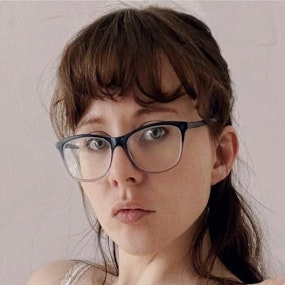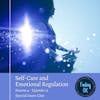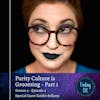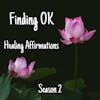Raising Yourself
Alice Cottonsox joins me to talk about recovering from childhood abuse, battling Agoraphobia, and facing online hate with humor. Alice is very open about her mental health struggles in her viral videos and she's helping many survivors feel less alone. Alice is being her own parent and raising herself, something that we sometimes have to do post-trauma when prolonged abuse as children has robbed us of the opportunity to grow up the way we deserved.
Alice's Website: https://www.cottonsox.co.uk/
Alice's TikTok: https://www.tiktok.com/@alicedoeswonderland?lang=en
Alice's Instagram: https://www.instagram.com/alicecottonsox/
Here are some of my favorites of her videos!
Going Outside:
https://www.tiktok.com/@alicedoeswonderland/video/7197807235156757765?lang=en
https://www.tiktok.com/@alicedoeswonderland/video/7238978249345289498?lang=en
https://www.tiktok.com/@alicedoeswonderland/video/7237546556323384603?lang=en
https://www.tiktok.com/@alicedoeswonderland/video/7213016240347024645?lang=en
Trauma Talk:
https://www.tiktok.com/@alicedoeswonderland/video/7217381847066479878?lang=en
https://www.tiktok.com/@alicedoeswonderland/video/7241885515643899163?lang=en
https://www.tiktok.com/@alicedoeswonderland/video/7191874000010743046?lang=en
https://www.tiktok.com/@alicedoeswonderland/video/7188860104647757061?lang=en
Alice Being Awesome
https://www.tiktok.com/@alicedoeswonderland/video/7227840114544741659?lang=en
https://www.tiktok.com/@alicedoeswonderland/video/7194465830086774022?lang=en
https://www.tiktok.com/@alicedoeswonderland/video/7174066013716286725?lang=en
https://www.tiktok.com/@alicedoeswonderland/video/7155122264155884805?lang=en
https://www.tiktok.com/@alicedoeswonderland/video/7154382013007482118?lang=en
Hecate's Links: https://linktr.ee/FindingOK
Become a Patreon Member: https://www.patreon.com/HecateFindingOK
Letters for the Fire: https://www.finding-ok.com/blog/letters-for-the-fire-season-5/
Thank you so much for listening. BLM. Take care of yourself <3
Raising Yourself
[00:00:00] Alice: People like their, their victims to be silent, even, even people who aren't abusers for some reason. There's a lot of enablers everywhere.
[00:00:22] Hecate: Hi there. Thank you so much for joining me. I'm Hecate, and this is Finding OK, a healing podcast for survivors of sexual assault and any and all abuse. When survivors share, we share strength. You are not alone. In today's episode, I'll be speaking with Alice Cottonsox. You might know her as AliceDoesWonderland on TikTok or AliceCottonsox on Instagram.
Her brand of dark humor feels like a safe haven, if your safe haven is a cemetery. Mine is. Every time I see she's posted a new video, I know she's about to [00:01:00] improve my day, and I know I'm not alone in that, because Alice has over 443,000 followers on TikTok as I record this, and she'll have more by the time this episode airs.
Her videos have a specific existential dark humor mixed with whimsy, honesty, and poetry. It's occasionally flirty,
always delightfully quirky, and if you're weird, slightly spooky, or neurodivergent it will help you feel seen and inspired. Alice is a survivor of childhood abuse, and she is very open about her struggle with mental health in her videos. I was thrilled when she agreed to join me as a guest and today we'll be talking about how facing past traumas has affected her, where she's at in her healing journey, and how she's caring for herself not only as a human being, but as someone who has a strong presence on social media, who is subjected to a lot of vitriol for showing up as her authentic [00:02:00] self.
Alice lives in a small picturesque village in England, and so we did have some connectivity issues during our interview. The audio has a couple rough spots that are very brief, and if you're a Patreon member watching the video, it will be more noticeable. But, we made it work, and that's what matters. Fast internet is the sacrifice we sometimes make to be in beautiful places.
The more duck crossing signs a place has, the less likely they are to have fiber optic internet. Make a note of it. I'm over the moon that I got to talk to Alice, because I'm such a fan of her videos. And I'm really excited for you to hear from her as well. Before we dive in, if you enjoy the podcast, please consider supporting my work by becoming a Patreon member.
Tiers start as low as one dollar a month, and membership at any level changes my life. Tier 3 and 4 patrons gain access to a new supplemental patron podcast called Finding More. [00:03:00] Click the link in episode notes to learn more about membership benefits. And now it's time for...*duck quack* Trigger and content warnings for this episode include the following:
trauma, childhood sexual abuse, agoraphobia, and cyberbullying. Please check in with yourself and make sure you're alright to continue. So, uh, before we get started, I just wanted to acknowledge how weird it must have been to, like, actually be able to see someone just, like, stalking your social media feeds, like, before having to speak to them.
It felt really weird.
[00:03:37] Alice: I did see that, but I found it very exciting. I was like, oh!
[00:03:43] Hecate: And I, like, every time I, like, posted or, like, looked at something, like, I, I was like, maybe I should make this less weird by not pinging her with notifications.
[00:03:52] Alice: Never make it less weird.
[00:03:52] Hecate: But I was like, you might as well get the likes out of it, whatever, you know.
[00:03:56] Alice: I like, I like weird. Always embrace the weird. [00:04:00]
[00:04:00] Hecate: I like that, and, and I appreciate that about you.
[00:04:02] Alice: Thank you.
[00:04:04] Hecate: And I'd like to start by asking, are you okay?
[00:04:07] Alice: I am okay. Well, I'm surviving. I have like maybe two good days out of seven, which I think is pretty good for now.
[00:04:21] Hecate: Yeah. I, uh, I hear that very strongly.
[00:04:25] Alice: I'm grateful for the two days.
I try and get a lot done in those
days.
[00:04:30] Hecate: It's always nice to make 'em count and uh, and just like appreciating them when they happen is always a, a good thing.
[00:04:37] Alice: Yeah.
[00:04:38] Hecate: Instead of just shaming yourself for the fact that there's only two.
[00:04:42] Alice: Oh, yeah, I do, I do a lot of that too. Yeah.
[00:04:46] Hecate: I'm trying to get better about not doing that, but it is, it is, uh, an ongoing process.
I'd love to hear a compliment that you've received and that you've never forgotten.
[00:04:56] Alice: You know, this is a hard question for me because [00:05:00] my brain is not very good at, um, paying attention to the positive stuff.
[00:05:06] Hecate: That's why I ask it because I'm a jerk.
[00:05:09] Alice: Ah, yes, I remember once when I was a little kid, one of my teachers said I was like a spider because I was very good at climbing. You know, in hindsight, I think she was trying to insult me, but I really liked that she called me a spider.
I like spiders.
[00:05:30] Hecate: I love how unusual that one is. And it's always, it's always interesting when someone says something that in retrospect, you're like, I don't know how you meant that, but like, it sticks in a, in a good way. I like those ones.
[00:05:46] Alice: I
think, I think I was a difficult student and, um, she probably resented me a little bit and that's why she was, she was saying it in, you know, not such a nice way, but I took it in a nice way because spiders are cool.[00:06:00]
[00:06:00] Hecate: They are cool. I've had a lot of arachnophobia very strongly for almost,
[00:06:05] Alice: Oh, really?
[00:06:05] Hecate: almost all of my life. Yeah, I, uh, my, my father let me watch a scary movie. When I was about five years old, he let me see the movie Arachnophobia.
[00:06:15] Alice: Oh, okay.
[00:06:16] Hecate: And I was just terrified. I recently did a whole like face your fears thing with a friend because she was afraid of dolls.
I was afraid of spiders. And so we watched horror movies together about them and like faced our fears together and it actually really helped. And now I have jumping spider friends in my studio, that like, I name and they all hang out and I'm like, so I'm doing much better about it. And, but
[00:06:37] Alice: That's amazing.
[00:06:38] Hecate: Spiders are awesome.
Yeah. And I used to like read books when I was a kid to try to make myself less scared by understanding them more. And they're awesome. They're amazing. They're fascinating.
[00:06:48] Alice: They
are. They are. They're so wonderfully weird. I had a, I had a pet jumping spider last year, but it died.
[00:06:59] Hecate: I'm [00:07:00] sorry.
[00:07:00] Alice: I miss him. He was very cute.
They don't live very long, I guess.
[00:07:06] Hecate: Did he have a name?
[00:07:07] Alice: He had lots of different names. I just sort of called him random names when they would come to my head. None of them stuck, but I liked it that way.
[00:07:17] Hecate: Yeah, I like how they make little hammocks, the, the jumping spider hammocks. It's very
cute.
[00:07:23] Alice: Yes. Yes. And they look at you when you, when you talk to them, they look at you because they can hear you.
It's very cute.
[00:07:33] Hecate: They're, they're like puppies with lots of eyes.
[00:07:36] Alice: Yes. I mean, they're a good, they're a good one to use to get over your fear.
[00:07:41] Hecate: I'd love to know what your favorite color is and what you associate with it, or your favorite color combination.
[00:07:48] Alice: My favorite color? Well, I think it's purple, but that's only because I buy a lot of purple clothes, because I don't, I don't know.
What makes a favorite [00:08:00] color? All colors are good, aren't they?
[00:08:03] Hecate: I've come across some people that hate certain colors.
[00:08:06] Alice: Really?
[00:08:07] Hecate: Yeah, and I think a lot of it is personal taste or maybe, um, like having bad associations with them or, I don't know.
[00:08:16] Alice: Oh yeah, I guess that makes, I mean, now I think about it, I don't really like yellow very much, so that makes sense.
I like the word purple more than the color, I think. It's just, it's just a good sounding word.
[00:08:28] Hecate: It is a good word.
[00:08:30] Alice: Purple. Purple.
[00:08:31] Hecate: Purple.
[00:08:33] Alice: It sounds funny.
[00:08:34] Hecate: Purple. Purple!.
It makes me think of the song Purple People Eater. It's a good one.
[00:08:39] Alice: Oh, yes, that is a good song.
[00:08:41] Hecate: I grew up with that one on the Dr. Demento, uh, CD that I used to play on repeat as a child listening to all the weird songs.
[00:08:49] Alice: I don't know what that is.
[00:08:52] Hecate: You know, when you like something as a kid, you're like, well, everybody knows about this or everybody likes this. And, and later you find out that it was kind of [00:09:00] unusual. Um, There was like a compilation of just the weirdest songs ever written. And so
like,
[00:09:08] Alice: Well, that sounds like something I would like.
[00:09:10] Hecate: Yeah.
Like, Poisoning Pigeons in the Park and Fish Heads and They're Coming to Take Me Away. Ha Ha.
[00:09:17] Alice: Oh I know that one.
[00:09:18] Hecate: Yeah. Like, so there are things that like you may have heard, or like Purple People Eater and, but it was all on one CD. And, uh, and I think they made like a couple of compilations. I'm going to turn this light purple for you.
[00:09:30] Alice: Ah, cool.
[00:09:31] Hecate: If I had to summon you in a ritual, what five things would I need to place as offerings at each point of the pentacle on the floor?
[00:09:42] Alice: You know, I thought about this a few times before you even asked because, you know, I like summoning things. It's a fun thing to think about. Um, and I always say definitely one of them is cereal because I only really eat cereal [00:10:00] and I just feel like that's like a big part of who I am now.
Cereal.
[00:10:04] Hecate: Do you have a
favorite cereal?
[00:10:06] Alice: I like Cookie Crisp. Do you have that over there? Cookie Crisp.
[00:10:11] Hecate: Isn't there like a dog that's like, Awooo! Cookie Crisp?
[00:10:14] Alice: Yes.
[00:10:14] Hecate: Oh,
[00:10:16] Alice: So you need five things, don't you? I think I would have to say Cherry Pepsi Max for the same reason as the cereal. I'm a very healthy individual.
Maybe my cat? I'm very similar to my cat. We were like kindred spirits. Uh,
some sort of doll. I like dolls a lot, especially if it's a broken doll or a very creepy looking doll. I love those. And the fifth one... just any dead thing, really.
[00:10:54] Hecate: Nice.
[00:10:55] Alice: Yeah.
[00:10:56] Hecate: Like bones, or decay, [00:11:00] or taxidermy or...?
[00:11:01] Alice: I love
taxidermy.
[00:11:03] Hecate: Gotcha.
[00:11:04] Alice: I have a little taxidermy mouse. See?
[00:11:09] Hecate: With a balloon! I love him!
[00:11:12] Alice: I want to get more taxidermy things.
Haven't yet though.
[00:11:15] Hecate: I'm actually wearing my muskrat jawbone earrings.
[00:11:21] Alice: That's
cool. I've never actually seen a muskrat apart from in, um, Red Dead Redemption.
[00:11:27] Hecate: I
grew up visiting my grandparents in Wisconsin and they were all over the place. We'd always see them like swimming through the water. So I've never seen one out of the water.
I think they just kind of look like giant rats that... Um, just sort of swim, swim around and
yeah,
[00:11:43] Alice: I'm jealous. We just get pigeons here.
[00:11:45] Hecate: There could be some, some good taxidermy pigeon situation that you have yet to discover.
[00:11:52] Alice: I would, I would
actually love that. I would love a taxidermy pigeon.
[00:11:57] Hecate: And I would love to hear [00:12:00] three essentials to
your self care.
[00:12:02] Alice: It's very easy. I'm very simple really. I have this Oodie, which I live in, pretty much, and also, also this giant water bottle, and um, noise cancelling headphones.
[00:12:18] Hecate: Nice.
[00:12:18] Alice: These are new though, I haven't had these for very long, but they've like changed my life.
Really.
[00:12:23] Hecate: I can relate to that. I, I got the, the Loop earplugs.
[00:12:27] Alice: Yeah, I've seen those.
[00:12:29] Hecate: They have made my life so much
better.
[00:12:31] Alice: Yeah, it's crazy how, how much I realized how I was like overstimulated all the time. When I got the headphones, I was like, oh, ah, what a relief!
[00:12:44] Hecate: Well, and just, just being able to, like, actually do something about it for the first time, instead of just freak out.
[00:12:50] Alice: Yes.
[00:12:51] Hecate: That's been a really nice thing, especially for, I don't know if they've noticed it yet, but probably also for the people that know me too, because I used to just,
[00:12:59] Alice: Yes! [00:13:00] yes.
[00:13:00] Hecate: Yeah, like, you know, or getting feedback just sort of like, wow, you're in a really terrible mood, like, you're acting kind of like a bitch. And it's just kind of like, well, I'm losing my fucking mind, sorry.
[00:13:11] Alice: Yes, exactly. Yeah.
[00:13:15] Hecate: So I, I first saw you and your content on TikTok and I wanted to ask, when did you start making videos and why did you start making videos?
[00:13:25] Alice: Well, it was around the time that I developed the agoraphobia because I was bored and I wanted to be able to work from home. I was already working from home, but that was, I was working in tech.
So I, it was coming to an end with the working from home thing after COVID. And I was like, I don't want to go to an office anymore. And so I started making the videos and that was over a year ago now. I wasn't expecting, um, [00:14:00] to have any sort of audience. Um, that, that was a surprise to me. It's still a surprise to me, but here we are.
[00:14:07] Hecate: You do have quite the audience.
[00:14:09] Alice: Yeah.
[00:14:10] Hecate: As a member of the audience, like something that I deeply appreciate about you is the specific sense of humor that you bring to your videos. There's a dark humor, there's the existential undertones. It can be, it can be flirty, it can be a little sexy, it can be like weird, quirky, like it's, it's all the things.
And whenever I get a notification that you have a new video up, it always just makes my day.
[00:14:38] Alice: Oh, thank you.
[00:14:39] Hecate: But I wanted to kind of just like talk about that specific dark humor, and what role that plays for you in your life and in your healing, or just kind of about that?
[00:14:51] Alice: Well,
you know, it's interesting because the only other people I sort of joked around with prior to making TikToks also had the [00:15:00] same sense of humor.
So I didn't actually think it was anything different until I started making TikToks. Um, it's always just come naturally to me. Since doing this, I've realized that a lot of it is like a coping mechanism, but it's like so ingrained within me now that I didn't, I just, that's just, that's just what I do, you know?
[00:15:24] Hecate: Yeah.
[00:15:24] Alice: I don't do a lot of socializing, like, in the real world, so I don't know how well those kind of jokes go down with, like, normal people.
[00:15:36] Hecate: It's interesting.
[00:15:37] Alice: Until I have a video go to the wrong audience, and then I'm like, Oh, okay.
[00:15:42] Hecate: Yeah,
no, uh, Doing that in real life and getting to see the things that happen, like, across a person's face when you say, uh, something is, it's a magical treat.
Um.
[00:15:55] Alice: I can imagine,
yeah.
[00:15:56] Hecate: Yeah. Um. I've sort [00:16:00] of noticed, I didn't for the longest time until I started kind of like talking with people about it that also had a similar sense of humor and we sort of started to notice like, ah, we've all had certain experiences in our past. So I think there, there is like a certain amount of, um, uh, I, I sort of like recognized you when I came across your content.
I was like,
[00:16:23] Alice: yeah, I
get a lot of people that instantly get it and I'm like, oh, okay. And then Yeah. And then you get the opposite of people who just assume the worst because they don't get it at all.
[00:16:37] Hecate: Yeah.
[00:16:37] Alice: Um, but it's easy to brush that off to a certain extent because I'm just like, you don't get it.
[00:16:43] Hecate: Yeah.
[00:16:43] Alice: That's okay. I'm happy for you.
[00:16:47] Hecate: Well, and I, and I wanted to talk about like the way, the way that you respond to people who just don't get it, or the people that come in to your comments and are, uh, just like, straight [00:17:00] up saying horrible things to you or being really misogynistic or just shitty to you. Um, you know, or, or like bullying you about like the way that you act or the way that you speak or, you know, things like this.
And you always have the most amazing response. And so I just kind of wanted to like, talk about some of the responses that you get to your content and to just the way that like who you are as a person because you show up as yourself like a lot of people assume that it's an act that must be wild, but you always meet it in the most amazing way.
[00:17:35] Alice: Thank you. Yeah, I mean, I can certainly understand it to a certain extent, especially because a lot of the hate I get from teenagers. They see a woman acting the way I do, having the voice that I do, and I'm older than them, and they're very confused by that, I think. But they don't have perspective on the world that I would expect, uh, even, [00:18:00] uh, even someone my age, to be honest, like, unless you've gone through stuff you don't really know.
So I don't hold it against the teenagers. I get a little bit more annoyed when it's adults. But again, I think a lot of people are either privileged, or they're not ready to face their own problems in that way yet, and so they just sort of, Ah! Get it away! So I guess I can, I can brush off a lot of the hatred, because I just see them as ignorant.
And it doesn't really matter what people who are ignorant have to say about the stuff I'm talking about, you know? And then at that point, it's just about using them and their ignorance for inspiration and being like, how can I take this and turn it into something else that will benefit me? Basically, selfishly, don't you know?
[00:18:57] Hecate: Well,
they're the ones that put it out there, [00:19:00] so.
[00:19:00] Alice: Exactly.
[00:19:01] Hecate: Might as well.
[00:19:02] Alice: Yeah, I mean, I, I actually recently had a guy who, he said some horrible thing to me and I, I made a video and replied to it and then he was messaging me afterwards, um, offering to pay me $15 to take it down because he was getting hate in his comments and I thought that was really funny.
[00:19:26] Hecate: Are, are you comfortable talking about, like, which video that was?
[00:19:31] Alice: Oh,
I can't remember which one that was. I don't know, there's been a few that people have had tantrums about. So they all sort of blur together in the end. I know which one I had, the most recent one I had controversy with. But that was again because it, it got pushed out to teenagers and I know when it's getting pushed out to teenagers because they all tag each other in the comments and they, [00:20:00] they talk a certain way.
It's very obvious.
[00:20:04] Hecate: I didn't realize that a lot of it was coming from teenagers. I think a lot of the ones that I keep seeing are from older men that
should.
[00:20:12] Alice: Oh, yeah. Well, they're, they're a completely different breed, they are.
[00:20:15] Hecate: Yeah.
[00:20:18] Alice: It's, it's very, it's very fascinating to, you know, I'll, I'll put thought into a video and it's, it's, it's, it's sending a message.
I understand a lot of what I'm saying is quite subtle so people don't pick up on it all the time. Either way, I'm putting effort into this stuff, right? And, and these men, they just come in and say the most disrespectful stuff. Thinking that, I don't, I don't know what they're thinking to be honest. They've all got different motivations, but I think really a lot of it is their attention seeking from me or something.
I don't know. But it's, it's disgusting is what it is. [00:21:00]
[00:21:00] Hecate: Yeah.
[00:21:01] Alice: Yeah.
[00:21:02] Hecate: But again, you always, you always meet it in the most amazing way. The response that's public, at least like is always incredible. Do any of them like ever get to you and, like, away from the things that we see, like, are, is there anything that you do on your own time to kind of, like, take care of yourself?
[00:21:21] Alice: I did have to have a break after the most recent one went viral because I have, I have a limit and every, you know, once there's thousands of people saying the most horrible stuff to you, I think you just have to kind of like turn the internet off and ignore it for a day or two. Otherwise it'd go crazy.
[00:21:43] Hecate: I'm glad you took a break when you needed one.
[00:21:45] Alice: Yeah.
[00:21:47] Hecate: There's like this, this thing that I keep seeing kind of happen with some of your content and it's when you will talk about something specifically, uh, there was one where, where you joked [00:22:00] about being molested, and people did not like that.
[00:22:05] Alice: No,
[00:22:06] Hecate: It's not the first thing,
cause the, I love the video that you have pinned right now on your tick tock and it's, it's the one where someone came in and was like, and accused you of like posting pedo bait and you respond, your perfect response. And it kind of had this, uh, this thing that like also very strongly relates to that whole situation, which is, um, the way that someone exists and the way that someone talks about certain things.
A lot of the time, like, it just makes people so uncomfortable, but it's kind of like, well, this is the way I am, and this is what happens to me, and I get to talk about it however I want.
[00:22:45] Alice: Yeah.
And I get to joke about it. Yeah.
[00:22:47] Hecate: I'm sorry if that makes you uncomfortable. Yeah! Exactly! Like, and, and there's that thing where, where, um, everyone, like, loses their fucking minds when someone who's actually been through it, like, makes a joke, and it's just [00:23:00] kind of like, no, we're, we're the ones that get to make the jokes.
Y'all are ignoring, like, everyone else making jokes about it, but then as soon as, like, we do,
like,
[00:23:09] Alice: People like their, their victims to be silent, even, even people who aren't abusers, for some reason. There's a lot of enablers everywhere, and those kinds of comments come from those kinds of people, you know. It's like, um, I replied to some of them, um, saying, well, no, hey, I, I was molested.
That's why I'm joking about it. And they will just double down on their stance and they'll be like, oh, okay. Uh, I get that and I'm sorry that happened to you, but you shouldn't be doing this and it's like, you just don't, you don't get it. And they'll say things like, I don't, I don't joke. I don't do these insensitive jokes.
I'm like, well, that's okay for you. I do!
[00:23:58] Hecate: Yeah. Well, [00:24:00] and it's yours to talk about. It's yours to joke about. It's.
[00:24:03] Alice: Yeah.
[00:24:04] Hecate: If you wanna, like, make light of it, I think that's incredibly important. I've joked about my bullshit, like, I think it's important. And, uh, uh, honestly, I don't know many survivors personally, like, that I've talked to that hasn't made a dark joke about it.
I think it's a very important part of reframing things for yourself, and. Yeah! Cause, like, what are you gonna do? If you can't poke fun of it or make light of it, then it just gets to be like heavy and scary and depressing your whole life? Cool. Fantastic.
[00:24:36] Alice: It's like, it's
like taking control back of, of it. And, you know, also a lot of it was just my life.
And if other people could make jokes about their life, even the bad stuff, then so can I. Just because mine makes you shocked, and you don't want to hear it because it makes you think of bad things. It's like, well, yeah, but that's what happened to me, you know? [00:25:00] Unfortunately. You know, this is the reality that we live in.
[00:25:03] Hecate: Yeah. Well,
and if, if, if that makes somebody uncomfortable, maybe instead of making that your problem, like they can, you know, go deal with the culture that we live in that perpetuates these sorts of traumas. Like,
[00:25:19] Alice: Exactly. I had one, I had one comment which made me laugh because it was someone saying that you shouldn't joke about molestation and he had a South Park profile picture and I found that hilarious because like, the South Park does that all the time.
[00:25:37] Hecate: All the time.
[00:25:39] Alice: People just want to have a stance against stuff. I, I'm, I think a lot of it is performative really. Once a video is getting hate, all these people come in and they want to fit in and they join in on the hate train, you know, and then it just gets out of control from there. And a lot of them just don't, just don't get the point of my videos.[00:26:00]
They think that I'm being serious, or I don't know, I'm pretending to have an uwu voice or something. They just think that that's what's happening, which is obviously I'm not doing that.
Yeah.
[00:26:18] Hecate: Well, and you, um, in the video that's pinned, like you addressed that perfectly and just kind of said like, well, I've been, you know, shaped by certain things that I've experienced and you're just making assumptions like the worst assumption about me when, yeah.
Well, I'll be linking some of your videos and in episode notes so that people can go watch for, for themselves.
[00:26:42] Alice: Yes. It's like you could make all sorts of assumptions about a person. Why do you jump to the conclusion that I'm pedo baiting? You know, it doesn't make much sense to me. I don't want them anywhere near me.
I don't think [00:27:00] most people do. No one wants that.
[00:27:03] Hecate: Yeah.
[00:27:04] Alice: I mean, you have people that do pedo bait, but they do it to, I don't know, catch them and punish them or something. So I don't know, as an insult, it doesn't really work in any way.
[00:27:16] Hecate: No, and if, if, I mean, like the, yeah, I don't, I don't get it. Cause you're, you're clearly like a grown ass person.
Yeah. Like you've got, you've got tattoos. You have to be an adult in order to do that, like, if nothing else, like, that's kind of a marker, but, you know, like, that's me being really, really very logical about the whole thing. But, like, you're, you're clearly a grown ass person.
[00:27:41] Alice: Yeah.
[00:27:42] Hecate: You're not, I don't, I don't know, like, I can, I can understand the childlike mannerisms thing, but it's just sort of, like, I don't, I don't get the argument.
I don't.
[00:27:50] Alice: I don't
dress like a kid. I don't. You know, I have a pretty adult body, like, I just don't, I don't know, I don't identify [00:28:00] with trying to be a child at all, you know?
[00:28:02] Hecate: Yeah.
[00:28:03] Alice: No.
[00:28:04] Hecate: No.
Well, and, I don't know, ultimately I can't, I keep kind of thinking, like, well, that there's a level of like participation. So if someone is perceiving you to be childlike and then sexualizing you, it's kind of like, well, I think you're sort of telling on yourself
in some way.
[00:28:25] Alice: I always ask, I've, I've been asking this question since I started getting these comments. I'm like, okay, but what childlike mannerisms? And I've never got an answer. I've never got one. It's like I have. I talk like an adult. I have a high voice, but the way I talk is like an adult. You know, I use words that kids do not use.
I talk about things that kids do not talk about. And I, I understand that some people think that I have certain mannerisms, but I don't really know what exact [00:29:00] mannerisms they deem to be childlike and they can never tell me. So I just think it's all bullshit really, just cause I'm a bit weird.
[00:29:10] Hecate: Well, and even if, uh, if they were to tell you like, here's a list of,
of what you're doing that's childlike. What's the next step? Is the demand that you stop acting in those ways because it's inappropriate? You know, so to pretend to be a different person in order to make other people more comfortable? Or like, I don't, I just don't,
[00:29:34] Alice: I mean, I don't think they think it through themselves when they say it. They just have an immediate reaction and then decide to comment with that immediate reaction and don't give it much more thought than that.
And that's why when I do call them out, they either don't reply, they double down with just illogical arguments, or, or they have a tantrum. [00:30:00]
[00:30:00] Hecate: Yeah, you do have a lot of people having tantrums in your comment section.
[00:30:04] Alice: Yes. Well, it's quite funny, really. I quite enjoy that.
[00:30:08] Hecate: It kind of is, because the argument is like, that you're childlike, and it's just sort of like, you are...
having a complete meltdown in my comments section, like a child in a grocery aisle. Like, I don't
[00:30:19] Alice: Who's child like?
[00:30:22] Hecate: Yeah.
[00:30:22] Alice: I don't think it's me. Mm hmm. My favorite is when the comments branch off and then all of a sudden there's like, seven people having an argument in a sub thread about... Jesus. And I don't know why they're talking about Jesus or, or, you know, Hitler or something.
It just,
[00:30:42] Hecate: Awesome.
[00:30:42] Alice: It just goes from nought to a hundred, like over this, the silliest thing. It's really horrifying.
[00:30:50] Hecate: Oh, geez. Yeah. The internet is a magical place.
[00:30:54] Alice: Yes.
It's terrifying. It's terrifying. I never actually wanted to be like a [00:31:00] person on the internet. I don't know how I got here.
Honestly.
[00:31:04] Hecate: Yeah, I never planned to be on the internet either, and now I live here.
[00:31:09] Alice: Yeah.
[00:31:09] Hecate: I am still processing that. Yeah.
[00:31:12] Alice: Yeah.
So what am I doing?
[00:31:14] Hecate: Here I am.
[00:31:15] Alice: Yeah.
[00:31:16] Hecate: I know.
[00:31:16] Alice: Same here. Now.
[00:31:19] Hecate: You talked in one video about when you have experienced certain long term trauma from childhood into adulthood. That you don't really get to grow up properly and you talked about something that I really appreciated was the process of raising yourself or being a parent to yourself.
And I was wondering if you'd be comfortable just talking about what that like, raising yourself process is, and what that kind of means to you and what that's looked like for you. Because I know that that's highly relatable and that there's a lot of people who're maybe haven't like put, put it in those terms, but are starting to, to kind of work on that same [00:32:00] process for themselves.
[00:32:01] Alice: Yes. Becoming your own parent. Yeah, there was a, there was a period and it wasn't that long ago where I was reflecting on my childhood and over a while, realizing more and more that, oh, even the good parts, like, everything... my parents were shit basically, you know? And I was let down in so many ways that to me was normal because I was a child and you just think that your parents are the boss.
They're right, they're always right you know? But certainly mine always had that attitude. And um, It was the process of learning that, hang on a minute, I was a child and they were an adult, and I don't think it's right to treat a child that way. Hang on a minute. I would be a better parent to myself, you know?
And then, and then going, oh no, all these problems that I [00:33:00] have, a lot of them are age regressing in a way. You know, I age regress when I'm having a bad time, and then recognizing that it's because those parts of me were not nurtured as a child and I have to nurture them now because I have no one else to do that, you know, I'm the adult now.
And that's just like part of taking responsibility for yourself is nurturing the parts of yourself that are, you know, struggling.
[00:33:34] Hecate: Can you talk more about what that means to you, or how you've been trying to nurture parts
of yourself?
[00:33:41] Alice: Uh, a lot of self care, making myself do things, even if I think those things, uh, are selfish, or a waste of time. I have to, I have to stop and think, hang on a minute, would I say that to someone else? Would I say that to, [00:34:00] you know, no, I wouldn't. And then just treat myself like a person, basically, you know? You know what, it's okay to have a bad day and not go outside today, but it is really hard to do that.
[00:34:14] Hecate: You've
talked a lot about the struggle with agoraphobia in some of your videos and you've filmed some really beautiful, just like, come outside with me today and, uh, and really, really beautiful and inspiring. And, um, when did the agoraphobia start to show up for you and how are you kind of working with it?
What's this process like?
[00:34:35] Alice: So I, I left abuse a few years ago. And then I had what I think is sort of like a honeymoon period after that where I was like, I'm, I'm fine, you know? And I don't know, that was a year or so, and then all of a sudden, everything hit me because I, I had to move out from where I was staying and I went to live in my childhood [00:35:00] home.
And that was sort of the catalyst for I guess was a bit of a breakdown and um, the agoraphobia started around then. I mean, I had smaller episodes of it before, but it became a consistent problem at that point. I, I then made the decision to move away from there. I was like, I cannot stay in this house anymore.
It's making me really sick. So I moved to this lovely little village thinking that, um, you know, then I can go outside and it's, it's, it's nicer. It's safer. It's quieter. The people here are all very old and non threatening. So, um, and that was a really good idea. I've been sort of battling it ever since moving here, but I do get out more because it's nice here, so it has helped.
[00:35:54] Hecate: It does
look beautiful
there.
[00:35:56] Alice: Yeah, it's smelly, but [00:36:00] that's fine.
[00:36:01] Hecate: I did see there's some sewage problems.
[00:36:04] Alice: Yeah, so we have lots of protests going on at the moment because our water company is pumping sewage into the water, and you know, that causes a lot of problems, so there's protests. But it looks nice, you just don't breathe through your nose.
[00:36:26] Hecate: I have also lived in a very beautiful and smelly place with similar issues.
[00:36:33] Alice: Yeah, I mean, I'd take over a city any day because it's just, it's
very calm.
[00:36:38] Hecate: So you did, you did mention that you were in your childhood home for, for a brief minute. How long ago did you leave and are you comfortable talking about how or why, like, you, you realized, like, this is a problem?
Or what you were experiencing there that made you realize that like, I need to extract myself from [00:37:00] this situation. I need to leave.
[00:37:01] Alice: I moved. I moved away from there about a year ago, and I was there for only a few months. I wasn't, I didn't predict it happening at all actually, because at this point I hadn't, because I have so much trauma.
At that point, I hadn't really dealt with a lot of the childhood stuff, which is primarily what the home was triggering so that was just suddenly like dumped on me with no warning and I had no idea it was going to happen. And I just had, like, I think I think it was a very prolonged period of fight or flight, and I just had the urge to just run away.
But then this crippling depression after realizing I had nowhere else to go. You know, I ended up actually, I spent two weeks in an Airbnb. Before that I was going to hotels on the off night just to get away from [00:38:00] the house. Because I was just so constantly triggered I couldn't, like, I couldn't get anywhere.
I was, um, I was hiding under my desk a lot, just so I didn't have to look at, look at things. And I was like, I, I just, I couldn't live like that anymore. It was, it was going in a very bad way. So I had to leave. Um, yeah.
[00:38:24] Hecate: Gotcha. Thank you for talking about that. Like, I don't want to focus too much on that or get you into a
bad headspace. I'm so glad that you're in a new place now.
[00:38:33] Alice: Yeah.
[00:38:34] Hecate: We've only gotten to see like a little bit of, of your, your living situation, but have you taken ownership of, of your space or like decorated or, or done anything that makes you feel like this is my place, this is safe?
[00:38:47] Alice: I did. Yeah. I, I immediately painted the walls when I got here and I didn't have any furniture or anything.
So I went shopping around all the, there's loads of [00:39:00] charity shops around here, which are like thrifts. Do you call them thrift stores?
[00:39:06] Hecate: Yeah.
[00:39:06] Alice: So they're like big buildings and there's, there's a few that are just around the corner from me that just do furniture so I, so I bought loads of second hand furniture and, and that was fun.
But then my agoraphobia sort of developed into only feeling safe in this one room, so I don't actually spend a lot of time in the rest of the house. But I painted in here, see I have a blue wall. And it's got pictures all over the walls. So it's nice in
here at least.
[00:39:41] Hecate: Yeah. How do you take care of yourself when there are days where you can only be in that one room?
[00:39:48] Alice: Well,
that's why I have a giant water bottle because I, when I'm having a very bad day, I don't do a lot of moving and that becomes problematic if you don't have like snacks and [00:40:00] stuff in here because I would just not eat if I don't put those things in place first. So that's important. And then I just sort of, I've been trying to give myself a break because I really like playing video games.
But um, I have a lot of guilt because of trauma about doing anything that's not productive. So I've been trying to give myself a break and play more video games.
[00:40:29] Hecate: What do you play?
[00:40:30] Alice: At the moment I'm playing Red Dead Redemption 2, like exclusively. I'm a bit obsessed with it really
at the moment.
[00:40:38] Hecate: I've never played it.
I've only seen a little bit of it, but I saw that there was, um, somebody who was taking landscape screenshots and sending them into the local news station, and the news station kept publishing them thinking that it was someone sending in like actual photographs of their region.
[00:40:56] Alice: That's amazing.
[00:40:57] Hecate: Just like A plus trolling.[00:41:00]
Just beautiful, beautiful. Um, but it is a really gorgeous game.
[00:41:03] Alice: It is.
[00:41:03] Hecate: So it's, it's easy to, to pull one over on news stations. Should you hear this and be inspired, go get 'em. Yeah, no, I, I play a lot of video games. I didn't used to for a while, but I've been really loving it and enjoying the socialization aspect.
Cause I, I struggle a lot with socialization, making friends, spending time with friends, and it's really nice for me to be able to hang out with people in beautiful, beautiful virtual worlds and not have to leave a space that feels safe.
[00:41:36] Alice: Yeah, I used to play a lot of Fortnite for that reason.
[00:41:39] Hecate: I just got into Fortnite.
I'd never played it before and within the last, I think, month. Started playing it for the first time and I'm loving it.
[00:41:47] Alice: I
haven't played it in a couple of years, but I was very good at it. And then, um, I didn't play for a few months and then everyone got way better than me. And I was just like, I just, I can't be [00:42:00] bothered with this level of research that you have to do to be good at a game.
[00:42:06] Hecate: I am a big believer in sucking at a game and having fun anyways. And it's something that I had, I'm, I'm really surprised that I ended up getting into gaming because when I was younger, I didn't have that mentality at all. I felt like I had to be good at everything that I did, and I felt really self conscious and embarrassed if I wasn't like perfect or amazing at, uh, at something that I was doing.
And, and just a lot of, just like, oh, feelings of deep shame that would happen whenever I had to actually learn something new. That was always really challenging. The process of actually learning something new or being witnessed during that process.
[00:42:52] Alice: I have those
same feelings. Very
strongly.
[00:42:56] Hecate: Yeah! And, and they're, they're a struggle and they do [00:43:00] intersect with gaming stuff.
So I never expected that I would end up getting into gaming, but I have, and it's been a really wonderful way for me to start to let go of those feelings of shame or, um, yeah, I never, I never expected that I would ever be able to enjoy just being bad at something or not amazing at something and just having fun
anyway. And I really, I really like that there are these beautiful, beautiful virtual worlds that you can just hang out and like, and, and yeah, just, just be like, I suck. It's pretty here. I don't care. I'm having
fun.
[00:43:33] Alice: I don't think I'm quite there yet. I'm jealous. Maybe one day.
[00:43:38] Hecate: It's a good way
to practice.
[00:43:40] Alice: Yeah.
[00:43:41] Hecate: And then maybe one day after practicing in a virtual world, I can go out into the real world and not be a shame filled, uh, gremlin creature. That sounds.
[00:43:51] Alice: That's the dream.
[00:43:53] Hecate: Goals! Hashtag goals.
[00:43:54] Alice: Yes.
[00:43:55] Hecate: Yeah. But you, you make really beautiful challenging your agoraphobia [00:44:00] and like exiting the house and like expeditions.
Does making content around that, do you feel any pressure to leave your house? Like, is this. I'm, I'm interested in, in the relationship between like challenging yourself for personal reasons or any pressure you feel to leave the house, like for content versus like for yourself for just personal reasons.
I'd love to just kind of hear what your experience is.
[00:44:25] Alice: I don't feel pressure to make content outside luckily, because I think that would be kind of awful, but I do put pressure on myself to go outside generally. Um, and so I use, actually use making content more as a motivator, because I'll be like, well, I could go outside and make a video today.
Like, it gives me a reason to go outside, which helps get me outside, you know. But I don't think I feel pressured to do that. Thankfully.
[00:44:56] Hecate: I'm
So glad to hear that
[00:44:59] Alice: Yes. [00:45:00] Yeah, I think that would suck. I put enough pressure on myself as it is really Sometimes I have pressure to make content but not to go outside and make content.
[00:45:11] Hecate: That's good.
[00:45:12] Alice: Yeah, it's, it's kind of, it's, it's nice actually, because it gives me a feeling that I'm accomplishing things by going outside rather than just like, oh, I went outside.
[00:45:25] Hecate: I, um, I don't usually refer to it as agoraphobia. I don't know. I don't know if I feel comfortable labeling it that for myself, but I did experience like after, um, Oh my gosh, it might've been like 10 years ago now.
I can't, I can't remember how long ago it was, but there was a specific shooting, mass shooting in America that really got to me. And directly after that, I started having a really hard time leaving the house. And there were like just a number of years where [00:46:00] I almost didn't leave the house at all. And, uh, and just didn't really,
I don't think people really noticed because I had always been very much an introvert, but it has been a struggle and just kind of like a ongoing, like, just very quiet journey of getting back into the habit or, or just kind of recognizing like, ah, this is something that is happening. And then the
pandemic was also a really interesting way that that kind of intersected with everything. And so kind of back into, into a place of, uh, of not really leaving the house much, you know, with the, the added pandemic edge to things. And, um, and for me, it's, I have like a radius around my house because I walk my dog every day, but if I get into a car, that's when I experienced a lot more challenge because it's, it's not just leaving the house or leaving that like that radius or that bubble of feeling of safety, but also now I am in a car and I will journey to a public place where there are people [00:47:00] that I don't know.
[00:47:01] Alice: Yes. Yes.
[00:47:02] Hecate: Making noises that I don't appreciate. And that, that is where I experienced a lot, a lot of, um, anxiety and just, uh, just like resistance and don't want to do the thing. So ongoing struggle, but I really appreciate your videos and the, like, going outside ones are very inspiring and I think they're probably helping a lot of people that are also struggling with the going outside thing because it's, uh, it's, it's a common thing that can happen for, uh, especially folks who have experienced
certain troubles,
so.
[00:47:36] Alice: Yes, I, I, I get people telling, more and more lately, people messaging me and saying that my videos are helping them, and that, that's amazing. I know, I never actually thought that sort of thing would happen, so that's like, that's very, it inspires me to carry on, I suppose. Positive feedback loop.
[00:47:58] Hecate: Yeah, and we'll end up [00:48:00] all helping each other.
[00:48:02] Alice: Yes.
[00:48:02] Hecate: I like that. Yeah. In terms of healing from the past, what have you found the most challenging?
[00:48:11] Alice: Um, well, uh, it's hard to say. It's like all these phases I go through. At the moment, I'm having a lot of trouble with flashbacks. And like in isolation, these problems become so all encompassing that it's hard to sort of gauge which one is worse.
They're all pretty bad, you know? So yeah, at the moment I'm having a lot of flashbacks, which is, is horrible. And, um, really feeds into that agoraphobia because, uh, I am way more triggered by things outside of the house, then I am in my little bubble where I'm safe and I can control everything. So that's, that's, that's hard at the moment.[00:49:00]
So, I'm like, I don't actually know where I am with my healing because it's so zigzaggy up and down. So I don't know, I don't feel very healed yet.
[00:49:12] Hecate: I love that you mentioned the zigzaggy because that is... Very much what the path looks like is a zigzaggy one rather than like the, the, one of my favorite reminders is that healing isn't linear and it's, it's very true.
So I don't think of, um, I it's, it's very rare that I talk to a survivor that talks about things in terms of unhealed versus like healed, like done. I did it. I am healed. Um, it happens! And it's always very surprising when it does, but I'm like, okay. Uh, you know, and maybe someday I'll be like healed. Um, but I, I don't know.
Um, but for now, like, I, I very much am a believer in like, yeah, that, that zigzaggy kind of thing. And, and that, that is [00:50:00] part of the process is, is the ups and downs and, um, that that is process and that it, you know, even, even if something feels like a step back, that it's not, it's just, you know, a dip in the road and that, that is a part of that, that progress.
[00:50:15] Alice: Yeah.
[00:50:15] Hecate: And that, that's okay. And try to try to tell myself
that.
[00:50:19] Alice: Yeah. I try and embrace the bad days as bad days and just try and take each day as they come, really. I, I, I did get this realization not so long ago that I'm sick and, and it's okay to be sick, like before I just try and deny, deny, deny everything, it's like, no, I'm fine!
I'm just, you know, lazy. But no, I'm sick and that's okay.
[00:50:48] Hecate: Yeah. Well, and that's a huge step too, just acknowledging, like, what you're actually coping with.
[00:50:55] Alice: Yeah.
[00:50:56] Hecate: Yeah. I've certainly been in the, [00:51:00] um, cover it up and tuck it away and let's not deal with this kind of place. And it's, uh, sometimes that's, that's what needs to happen too.
Um, sometimes that's all you can do.
[00:51:09] Alice: Yeah.
[00:51:10] Hecate: You know, and, and then you get to a safer, you know, kind of, kind of space where you can start kind of unpacking things and just kind of like, Oh, look at this. What is this fresh hell? Like, ah, okay. And
[00:51:21] Alice: please kill me.
[00:51:22] Hecate: Deal with it.
[00:51:24] Alice: Yeah.
Yeah. That's where I'm at right now.
Just unpacking all the crap.
[00:51:29] Hecate: Yeah. And I want to ask where have you found strength and support?
[00:51:36] Alice: I don't know. I don't know. I don't know I just keep going. It's just what I do. Just keep going. Just keep swimming. Dory!
[00:51:46] Hecate: Yeah.
[00:51:47] Alice: Got it from Dory. Yeah.
[00:51:48] Hecate: Just keep swimming.
Just
keep swimming.
Yeah. Very much so. So my last question is, do you have anything that you want to say to the survivors who are listening?[00:52:00]
[00:52:00] Alice: Just
keep swimming.
[00:52:02] Hecate: Yeah. Yeah. I like it. There are definitely times where that's all there is. Yeah.
[00:52:08] Alice: Yes. And I believe you. It's another good one.
[00:52:11] Hecate: Yeah. It's a super important one. Yeah. Yes. Like, I, I appreciate you. Thank you for taking up the space that you take up. Thank you for talking about the things that you're talking about.
Thank you for your platform and just like you being yourself and showing up and thank you for taking the time to come here and talk to me, uh, especially about some kind of super intense stuff. So I very much appreciate that and I appreciate you. Yeah. And thank you.
[00:52:45] Alice: Thank you!
[00:52:47] Hecate: Yeah.
[00:52:47] Alice: Stop saying nice things to me.
I can't cope with it!
[00:52:52] Hecate: That's, that's what I do. I show up on the internet and I say nice things to people.
[00:52:56] Alice: Ahhh!
[00:52:57] Hecate: and then I, and then I just like sneak away and, [00:53:00] and live like a gremlin. And yeah.
[00:53:03] Alice: It's a good, it's a, it's a good way to live, I think. I support it.
[00:53:08] Hecate: Yay! Alright, I think that's all. Yeah, so do we want to end with an anyways bye?
[00:53:14] Alice: Oh
yeah! Anyway, bye!
[00:53:17] Hecate: Anyway, bye!
[00:53:19] Alice: Yay!
[00:53:20] Hecate: Thank you so much for listening. Please check episode notes. There you'll find links to Alice's website, her social media, and a few of my favorite videos that she's done. I don't want to talk about how many hours it took me to narrow down that selection. They're all excellent.
Watch them all. Episode notes is also where you can find all my links, so you can check out my website, follow me on social media, subscribe on YouTube, and catch me live on Twitch. Shout out to all the patrons that made today's episode possible. Thank you Emerald, Christopher, Meadow, Kathleen, Betty, Ashley, Sedonka, and Bryony.
You all mean so [00:54:00] much to me, and none of this would be possible without you. Thank you. Letters for the Fire is back and I'm accepting submissions till the end of the year. Listeners are invited to write a letter to their rapist or abuser and send it to me. I read all of your letters in a special episode at the end of the season and burn them for you.
You can learn more about how to participate by clicking the link in episode notes. Today's episode was edited and produced by me, Hecate. The music is Your Heart is a Muscle the Size of Your Fist, used with the permission of Ramshackle Glory. Thank you again for listening. This has been Finding OK.
Black Lives Matter. Take care of yourself.
[00:54:42] Ramshackle Glory: Your heart is a muscle the size of your fist. Keep on lovin. Keep on fightin. And hold on, and hold on.
Hold on for your life.
Your heart is a muscle[00:55:00]
the size of your fist.
Keep on lovin. Keep on fightin.
And hold on, and hold
on. Hold on for your life.
[00:55:36] Alice: Anyway, bye!

Alice Cottonsox
Content Creator / Artist
Alice Cottonsox is managing trauma recovery with the help of short form video making and being weird on the internet.
Alice lives in a small picturesque village in the UK where she takes walks, creates videos and art, frequents cemeteries, and befriends spiders.




































